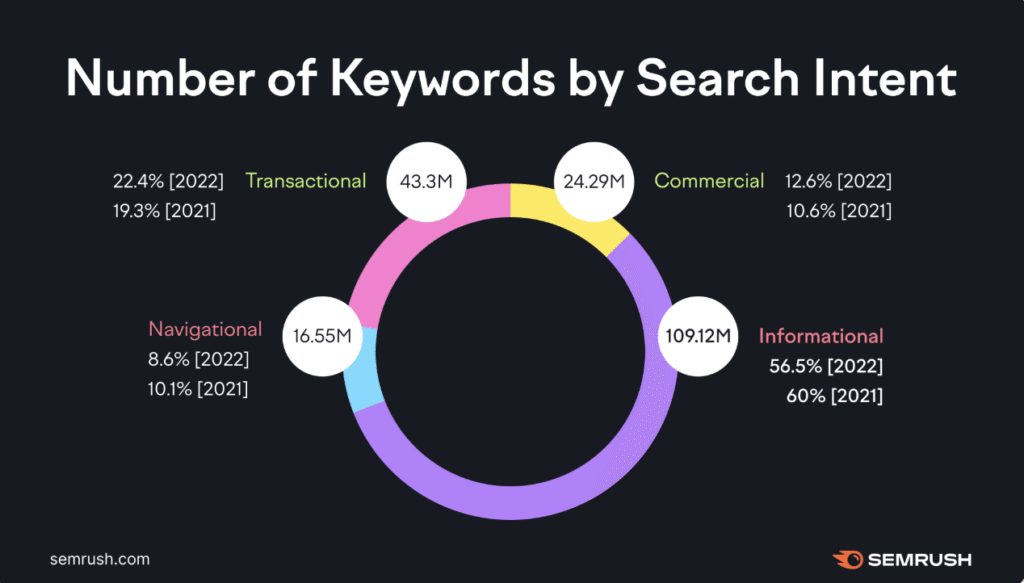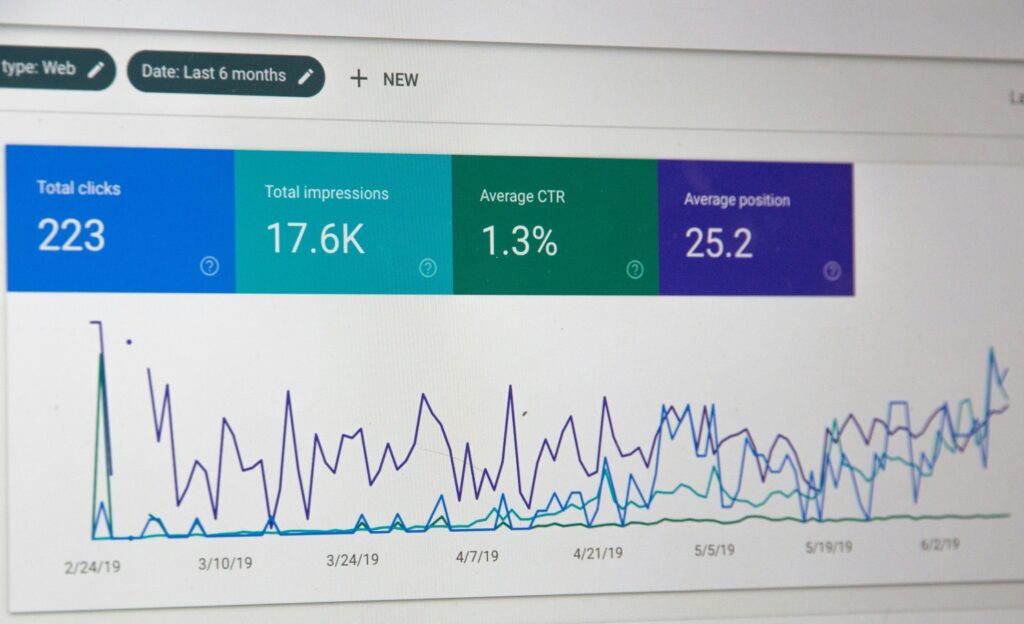The way we search for information has changed.
I don’t think this needs a lot of explanation – you might have heard of this thing called AI.
While other people debate whether it will steal all our jobs or enslave humanity, I wanted to focus on the real question: what are the implications for SEO and Content Marketers?
Search is an incredibly broad category and I think it’s important to distinguish between the different workflows it enables and think about how and when each of those are likely to be disrupted by AI.
The Different Categories of Search Term
Traditionally we can group Search terms into four categories.
- Informational: Searchers want to acquire knowledge on the topic. “How can I lose weight”
- Commercial: Searchers want to investigate brands, products, or services “Men’s running shoes”
- Navigational: Searchers want to find a specific site or page. “JD Sports”
- Transactional: Searchers want to complete an action. “JD Sports Nike Zoom Fly 5
It’s likely that all of these purposes are ultimately replaced, or significantly impacted, by AI and resulting shifts in how we interact with the internet. The workflows will remain, but Search as we view it today won’t be a part of the process.
Precise data on the topic is hard to come by. SEMRush last published their State of Search report in May 2023 and it showed the beginning of a trend away from Informational search terms, from 60% to 56.5%. ChatGPT launched in November so we can probably attribute some impact, and certainly expect the trend to have accelerated in 2023.

Subsequent research by Audience Research provider SparkToro confirms that this was no anomaly. They looked at trends in Search traffic to the Open Web – that is, traffic that Google directs to organic results rather than Google-owned properties or paid ads. Despite a bump in Summer 2023, the data shows a steady decline in both the EU and US.

Anecdotally, it is generally accepted that this data is indicative of a long term trend away from informational searches. Borja Santaolalla, co-founder and CXO of Empathy.co noted a rise in “mission-driven queries”, which would encompass navigational, transactional and commercial search terms. Google’s embedded AI functionality within Search is also driving further growth in what many term “zero-click searches”, posing a major problem for marketers reliant on organic SEO as a revenue driver.
Where are we in the Disruption Cycle?
Before we think about what a post-Search world might look like and how B2B Marketers can begin to prepare, let’s look at each of those four categories of Search term and think about the likelihood and speed of disruption.
- Informational. AI has largely replaced for technology-savvy industries and individuals. Intelligent chatbots provide a simpler, faster way to summarise and digest large volumes of information.
- Commercial. AI is coming. This is the next phase in the development of Gen-AI. It requires up-to-date data on evolving variables including product offerings and releases, features, customer feedback. This data is not centralised and there are structural problems to solve in terms of how models access the data in real time and how value cascades back to the source.
- Transactional. This is more of a hardware problem in terms of how we interact with the internet. As long as this takes place via a screen, this workflow feels safe; even if data input evolves beyond the keyboard (e.g. voice), we will still transact via a webpage and will need a fast route to that page. Disruption is coming, but there seems to have been a big dip in interest in this area following a wave of relatively unsuccessful attempts at disruption that followed ChatGPT’s launch (see: Humane AI Pin, Rabbit R1).
- Navigational. Similar to Transactional. As long as we interact with the internet as we do now, we will turn to search engines as a shortcut to typing in a URL and navigating the sitemap or onsite search function.
In summary, a seismic shift is underway for Content Marketing and SEO. The time horizon is unclear, but I believe it will be slower than the more bullish experts predict. Such drastic change in 18-24 months, as some believe, seems to ignore the level of commercial wrangling, enterprise transformation and behavioural change that is required.
“Mission-driven queries are starting to become increasingly popular…”
We have seen a significant impact so far but it is not structural. People use Search to conduct research, it just happens at a later, more solution-oriented stage in the buyer journey. SEO strategy – identifying keywords relevant to our buyer’s journey and optimising for them – still works, only the keywords themselves have evolved to more “mission-driven queries”.

Long-term Outlook: What will “Post-Search” look like for Marketers?
This is a rapidly evolving landscape and by all accounts, the rate of AI development is exponential. From the outside, it is impossible to project when another ChatGPT-level transformative breakthrough will take place.
As such, the key is to remain flexible. One thing is for sure, though — SEO will remain a practice in spirit, if not in form. As LLMs begin to grab more and more commercial, transactional and navigational workflows from Search, it will be dependent on access to real-time product and market knowledge.
This throws up problems that won’t be solved overnight. Technology might improve exponentially, but deal-making between large enterprises is slow. We saw this in the informational era of the Search → AI transition. It took 18 months of legal handwringing for OpenAI and News Corp to come to an arrangement to provide access to the company’s journalism. The process is ongoing, and less amicable, for a lot of other publications.

A similar process will need to take place in the Commercial era, only not with a consolidated group of media organisations. It will need to take place with all the various inputs that would go into removing Search from a user’s commercial research. Any model would need up-to-date access to product offerings, specifications and features of all the players in a market. It would need access to reviews, social discussion, and so on.
This poses a technological problem but also a structural problem, akin to how SEO itself evolved.
The technical route for relevant parties to feed proprietary data into the LLM is, as yet, unclear. So too is the mechanism by which value would cascade through that chain to incentivise each party. This is particularly complex when it comes to third party data that is critical to consumer decision making (e.g. G2, Trustpilot, etc.) yet is not trying to sell a product or service — the knowledge itself is the product.
This is going to take time to establish and cannot be solved through a few strategic partnerships given that this data is fragmented across service providers, social media, traditional media, review sites, and so on

It’s akin to how the “click” was established as the currency of Search. This gave Google a tool through which they could incentivise third parties, on whom they relied, to buy into their reinvention of the dewey decimal system. A new marketplace by which holders of information are incentivised to feed real-time knowledge into whatever replaces Search will be needed, but it is unlikely to resemble SEO or content marketing.
Google was a librarian, but ChatGPT is a teacher. A teacher doesn’t need well classified, engaging and coherent books to help a student. He or she needs raw knowledge, repackaging that knowledge dynamically for each student.
Google was a librarian, but ChatGPT is a teacher.
The business imperative of informing the market on your offerings will, of course, remain. But “content” as we know it today will not be the form. Currently, “content marketing” necessitates a range of considerations – format, design, narrative, etc. – that will not be there because LLMs will be a more proactive intermediary than Google has been.
Summary
Essentially, there are three stages of the evolution from Search to AI.
- Informational Era – largely complete in some industries and demographics, catching up in others (yes, Boomers, I’m talking to you).
- Commercial Era – incremental transition, as commercial agreements and capability upgrades enable real-time information, of commercial workflows away from Search.
- Navigational Era – Drastic shift in how we interact with the internet and technology.
SEO remains a valuable tool in the Commercial era, albeit likely pushed further and further down-funnel as Conversational AI incrementally begins to satisfy more and more commercial use cases. It’s also worth noting that phases 2 and 3 are likely to be significantly slower because technological development is not the blocker. Enterprise adoption and inter-organisational commercial agreements are the blockers, and they will take a lot longer to react.
As such, it is not time to panic. It is time to act, though, and direct your strategic bets towards optimizing your marketing engine for the Commercial Era of this transition.
As such, we have a few recommendations.
Short Term Recommendations: How should we adapt?
The first answer is be prepared to do just that. AI is improving exponentially and if OpenAI proved one thing it is that major, transformative breakthroughs can catch us by surprise.
Previously, marketers created awareness content designed to capture informational search traffic. This captured large volumes of low intent traffic, relying on inefficient onsite conversion funnels to turn some of this traffic into leads that Sales could follow up on. Inevitably, lead quality was not ideal, and the relationship between Marketing and Sales in many SaaS companies became fractured.
Clearly, this is not (and was never) an efficient strategy. Fortunately, increased focus on go-to-market efficiency plus a decline in informational search terms makes a rethink unavoidable. We would recommend directing spend in three directions in the short and medium term.

1. Off-Platform Content.
“Awareness” now takes place before a customer arrives on your website. You need to invest in bringing awareness content into your customer’s world rather than relying on Search to bring them to you.
AI is your friend here – repackaging content to be distributed across multiple different channels and formats has never been easier.
2. Shift SEO Strategy Down-Funnel.
Re-orient your content goals from traffic and reach to lead generation and more importantly, revenue impact. Think about high-intent commercial and navigational search terms that you can capture with targeted, quality bottom-of-funnel content. The “MQL” should not be viewed as a torch passing moment from Marketing to Sales, your SEO strategy should absolutely focus on continuing to engage buyers that are already in pipeline.
Again, this is good news. These terms are likely to be much more specific and much less competitive. This lets you divert a portion of your paid and organic budgets. It also enables you to convert traffic more efficiently – it is much easier to produce high quality content that caters to more specialised, high-intent search terms.

3. Every Visit Counts – Invest in Content Experience
B2B Content Experiences are incredibly static. Gating decisions are binary, messaging is limited and generic, data capture is repetitive. This made sense when traffic was low value, but do you really want to give a digital f*** off to a high-intent prospect via a badly timed, unpersonalised content gate?
There is a place for gating, but it should be reader-led and form part of a really personalised strategy to build relationships with a targeted, intentional audience.




